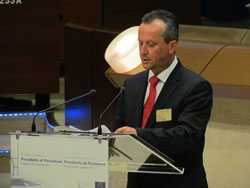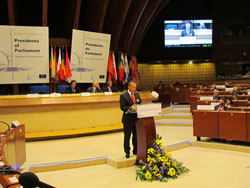Thursday, 20 September 2012, Strasbourg
Adress of the president Veljanoski at the first session: Future of the European Court of Human Rights – role of national parliaments
 First and foremost allow me to express my appreciation to participate in the debate for the future of the European System for protection of human rights. Since its establishment, the European Convention on Protection of Human rights and freedom and the European Court have confirmed to be an especially important international document and instrument deeply embedded in the legal and political systems of our states.
First and foremost allow me to express my appreciation to participate in the debate for the future of the European System for protection of human rights. Since its establishment, the European Convention on Protection of Human rights and freedom and the European Court have confirmed to be an especially important international document and instrument deeply embedded in the legal and political systems of our states.
Still, a legal mechanism that exists for over half a century cannot face the challenges of time if it does not constantly upgraded itself. In the recent years, the Court and the legal mechanism it is based on, was the topic of three especially important conferences- Interlaken, Istanbul and Brighton. The fact that the initiators of these conferences were CE Member States from Central, South and North Europe undoubtedly demonstrates how important it is for us to have a developed, modern and efficient system for protection of human rights, as a key indicator of the general European dedication on democracy and the rule of law.
Allow me remind that my country, during its recent Chairmanship with the Council of Europe was an active participant in this process.
We are whiteness the trust and success of the Court lead to overcrowding, but this cannot be resolved through reforms for increasing efficiency alone. The efficient implementation of the protection of human rights envisaged by the European Convention on national level, as well as active guarantee and monitoring of the enforcement of the verdicts of the European Court for Human Rights should be underlined. The establishment of the balance between the national and international jurisdiction in the implementation of the Convention and the verdicts of the Court is a task for all member states.
The process of changes and promotion of the system for protection of human rights urgently puts the position and the role of the national parliaments on the agenda. According to the founding of the direct participants, such as the judges of the European Court, national judges and experts from our and other member states, the active role should be exercised in the two key segments: the parliaments are the legislative governance and institutions that control the executive governance.
 The parliaments are institutions where the culture of the rule of the law is being built, the culture for respect of the human rights and freedoms, developing democracy. In other words, as legislative body, the parliaments of the EC Member States, in the debate on the new laws and amendments thereof, are obliged to respect the principles and standards for protection of the rights guaranteed with the European Convention that is, the rights stipulated with the court practice of the European Court for Human Rights.
The parliaments are institutions where the culture of the rule of the law is being built, the culture for respect of the human rights and freedoms, developing democracy. In other words, as legislative body, the parliaments of the EC Member States, in the debate on the new laws and amendments thereof, are obliged to respect the principles and standards for protection of the rights guaranteed with the European Convention that is, the rights stipulated with the court practice of the European Court for Human Rights.
On the other hand, there are many forms of interaction between the Government and the Parliament, such as monitoring of the general implementation of the standards and principles of the Court in the enforcement of its verdicts, application of the MP Questions institute to the Members of the Government, as well as participation of the Government Representatives in the work of the parliamentary committees.
Esteemed colleagues,
The opinion and the evaluation of the developments are incomplete if there are not followed by a concrete contribution. That is why I would like to briefly inform you on what has been done in this area in the Republic of Macedonia. The strategic determination for EU and NATO Membership, as a strongest guarantee of the existence, stability and the future of our state, is generally accepted and followed by numerous reforms.
We emphasize the reform for independent and impartial judiciary, as a basis for realization of the constitutional order and international law, where the rule of law and the protection of the human rights and freedom are a precondition and part of the democracy. Numerous new institutions were established such as the Judicial Council, Management court, the Public Prosecutors Council, Academy for Training of Judges and Prosecutors. Also, the annual reports from the Biro on Representation before the European Court are being reviewed by the Assembly. We have introduced a new mechanism for adoption of the verdicts in reasonable timeline.
For the multiethnic, multireligious and multicultural states as the Republic of Macedonia, the protection of the rights of ethnic communities is an important indicator of the level of the development of the democracy, as well as of the harmonization with the European standards and values. The equality of the ethic communities in our country is deeply embodied in our Constitutional and legal order, implementing the Ohrid Framework Agreement, adopted with the support of the international community. This is one of the main pillars for the development of the democracy in our state, as well as an important element for preservation of the internal cohesion and also, an important factor for the internal as well as regional security and cooperation.
 The European Convention treats the protection of the rights of the minorities on individual basis, but in the same time, it should be taken into consideration, that the right for preservation and promotion of the minority identity can frequently be practiced on collective basis.
The European Convention treats the protection of the rights of the minorities on individual basis, but in the same time, it should be taken into consideration, that the right for preservation and promotion of the minority identity can frequently be practiced on collective basis.
The future development of the system of protection human rights, including the rights of the minorities, according to the European Convention as a basic document, should consider this characteristic. There were initiatives in PACE for a new additional Protocol of the European Convention for protection of the Rights of Minorities, which so far have not been finalized. Some member states have not fully implemented the decisions from the Court of Human Rights, as well as do not respect the reports and recommendations from ECRI, CE Commissioner of Human Rights, UN Special Rapporteur, and other international organizations connected with the recognition, preservation and development of the rights and freedoms of the national minorities.
The European Convention on Human Rights and Freedoms and the European Court for Human Rights are embodied in the foundation of the oldest and most numerous European organizations. The system for protection of human rights that arose from them is undoubtedly the gem of our organization, strongly shining in the years following the cataclysm of the World War II, which we should carefully preserve for the future generations, adding up new, modern charms.
Thank you.